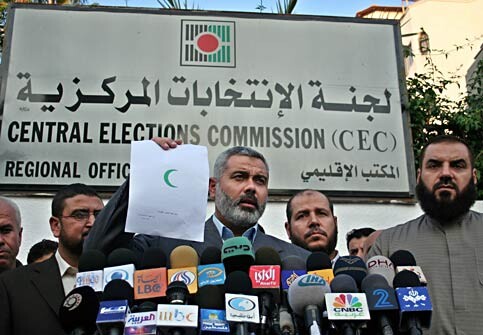The Electronic Intifada 19 December 2005

Hamas leader Ismail Haniyeh speaks during a press conference in Gaza City, December 14, 2005. (MAANnews/Wesam Saleh)
The US corporate media has started to examine Hamas’ victories in Palestinian municipal elections last Thursday. However, if The New York Times’ coverage is any indication, an honest evaluation of Israel’s role in increasing Hamas’ popularity is unlikely. Revelations over the last year have forced the US corporate media, with the New York Times at the forefront, to re-evaluate their role in promoting the Iraq war and occupation. Sadly, no such re-evaluation is underway with respect to Israel/Palestine. Israeli occupation, expansionism and human rights abuses still generally pass without comment.
On Sunday, the New York Times published one of the first analytical articles by a US newspaper on Hamas’ Thursday municipal election successes, Jerusalem Bureau Chief Steven Erlanger’s “In Era After Arafat, Islamic Militants are Edging into Power”. Erlanger explains Fatah’s losses and Hamas’ gains as purely a function of internal Palestinian politics. He gives no indication that Israeli violence and refusal to negotiate helped to radicalize Palestinians by undermining Fatah, the secular, centrist party that attempted to negotiate peace, and thereby strengthening Hamas, a religious party which has tended to reject negotiation and favor armed struggle.
Erlanger blames Hamas’ gains on a laundry list of Fatah’s failures - the “uninspiring personality” of Yasser Arafat’s successor Mahmoud Abbas, Abbas’ “lack of ability or will to use his [Arafat’s] aggressive tactics”, Abbas’ refusal “to jettison the old guard or to crack down and provide law and order in the streets”, the reality that Arafat’s “Palestinian Authority was criticized for corruption, indolence and a failure to care about ordinary Palestinians”, and the “generational struggle between those who were Arafat cronies and went into exile with him and those in their 40’s who grew up at home after the 1967 war, under Israeli occupation.” These crucial factors deserve readers’ attention, but they are only half the story.
Oddly, Erlanger failed to quote prominent Israeli politicians who criticized Israel as the election story broke. The Israeli newspaper Ha’aretz daily paraphrased Yossi Beilin, Chairman of the left of center Meretz-Yahad party, saying “Hamas’ strong showing in the elections is the “rotten fruit” of the Israeli government’s policy, which has destroyed the ruling infrastructure of the Palestinian Authority over the past five years.”
Ami Ayalon, a former head of Israel’s powerful domestic intelligence services the Shin Bet, told Le Figaro in France, “Hamas’ victory on Thursday in the West Bank is the result of Sharon’s policy.” Because of Sharon’s treatment of Fatah and the PA, “most Palestinians are convinced that the Fatah has failed and Israel’s withdrawal from the Gaza Strip is the result of terror.”
When Hamas was founded in the 1980s, Israel passively encouraged Hamas through a laissez-faire approach that contrasted with its relentless arrest and harassment of activists from other nationalist factions, such as Fatah. Nonetheless, Fatah gambled that it would be possible to negotiate a peace agreement with Israel that would allow the creation of a viable Palestinian state. So far Fatah has lost. A succession of Israeli governments has instead often seemed intent on proving correct Hamas’ assertion that Israel only understands force.
If the spotlight shifted to analyzing Ariel Sharon’s recent rise to political dominance it is hard to imagine that the Times would have left out the role of armed Palestinian attacks against Israelis in strengthening Sharon. Yet the US corporate media feels it completely appropriate to leave out Israeli violence and colonialism, and to avoid phrases like “Israeli occupation”, “international law” and “human rights”.
It is also difficult to imagine a New York Times article on Israeli politics without multiple quotes from a number of Israeli sources. Yet Erlanger’s 1,196 word article on Fatah and Hamas quotes only ten words from a single Palestinian analyst.
Experience suggests that on the rare occasions when Times’ reporters interview a number of Palestinians, the result is a fuller discussion of Israel’s role. For example, in an October, 2005 story on chaos in Gaza, Erlanger extensively quoted five different Palestinians. One of them, Talal Okal, said, “Israel worked to weaken the secular P.A. in the second intifada, and the P.A. performed badly… The failure of the political process created an atmosphere for the renaissance of Islamic doctrines and ideologies… When the P.L.O. … carried the flag of negotiations and the so-called peace process, Hamas picked up the flag of resistance.” Okal’s October analysis would have strengthened the Times’ article last Sunday.

Palestinian supporters of Hamas attend a rally to celebrate Hamas’ winning of municipal elections in major West Bank cities, in the West Bank city of Tulkarem, December 16, 2005. (MAANnews/Mouid Ashqar)
The Sunday New York Times’ article on Hamas’ increasing power demonstrates that the US corporate media largely continue to ignore Palestinian voices, and even ignore Israelis who are critical of Israel, instead privileging right-wing Israeli and American perspectives. Many Americans now understand that on Iraq the corporate media bowed to the views of powerful extremists and silenced alternative perspectives, with disastrous consequences. Americans now need apply the lessons about media coverage of Iraq to Palestine and Israel. Until we do, the tragedy in the Middle East will continue, with US backing.
Patrick O’Connor is an occasional contributor to EI and an activist with the International Solidarity Movement (ISM) in Palestine and New York City.





